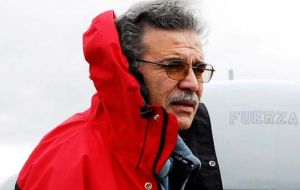MercoPress. South Atlantic News Agency
Tragedy in Antarctica: “much improvisation” and “a great lesson for Chile”
 Retamales said there was no backup unit for the generators room or to combat the fire
Retamales said there was no backup unit for the generators room or to combat the fire The tragedy in the Antarctic King George Island involving the Brazilian base should be “a great lesson for Chile” and is evidence that research scientists and military personnel coexist in Antarctica under “improvised conditions”.
“It was a horrible accident, and even worse that it happened at the generator room, this whole incident should be a great lesson for Chile”, said Jose Retamales head of the Chilean Antarctic Institute responsible and responsible for all Chilean activities in the region.
Modern bases need a lot of resources and this does not happen with Chile and Brazil’s efforts in Antarctica added Retamales who “admitted there’s quite a bit of improvisation which is a Latinamerican reality”. He mentioned for example the fact that the Comandante Ferraz base did not have a backup generators’ room.
“When fire breaks out in the generators’ room you run out of energy, water and alarms don’t work. There was no independent power unit to help put out the fire. Hopefully this will bring great changes so such an incident does not repeat itself”, insisted Retamales.
Retamales who was contacted in Punta Arenas where the Chilean Antarctic Institute is seated, to help fight the blaze said the situation was “desperate, because of the climate conditions: by sea it would demand two hours of sailing to reach the Brazilian base and by helicopter there was insufficient visibility. It was despairing not to be able to help as quickly as we wanted to”.
However Retamales said that in spite of the setback, Brazil must not desist from continuing Antarctic research and looks forward to more Chilean-Brazilian cooperation in the region.
“In spite of the fact that Brazilian history in Antarctica dates back to the eighties, the scientific production has been significant, and it is an obligation of all countries. Brazil can’t be absent from Antarctica” said Retamales who revealed that a cooperation agreement with Chile is to be signed in coming days.
Meanwhile the Brazilian Navy reported 70% losses at the Ferraz base and Jefferson Simoes, head of the Polar and Climatic Centre from the Rio Grande Do Sul Federal University said that the Brazilian Antarctic program has been reduced to half because of the blaze.
“Bio-science, atmospheric chemistry and environment monitoring to assess human impact were the fields which most suffered by the fire”, said Simoes. However research will continue since Ferraz is not the only Brazilian Antarctica outpost.
“Half of our researchers work from scientific vessels or in isolated stations in Antarctica” revealed Simoes.




Top Comments
Disclaimer & comment rulesCommenting for this story is now closed.
If you have a Facebook account, become a fan and comment on our Facebook Page!